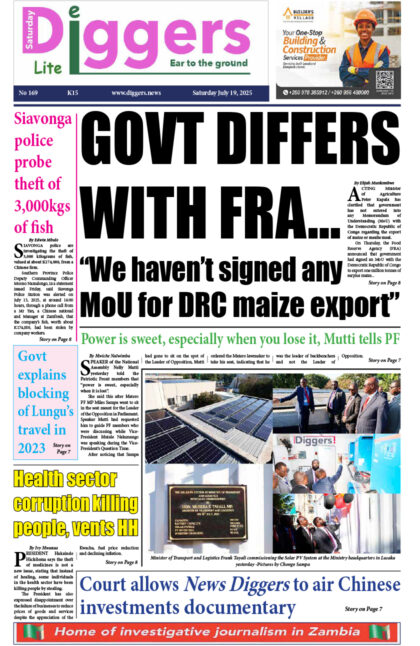TRANSPARENCY International Zambia (TI-Z) president Sampa Kalungu says Zesco should have the courtesy of explaining why it decided to cancel a tender to supply 25 luxury vehicles which were advertised in the State newspaper.
And Kalungu has urged the new dawn government to match its pronouncements on the fight against corruption with resources.
In an interview, Kalungu said people were left to assume that this could have been a flawed tender process because no information had been provided by Zesco to explain the cancellation.
“In whatever we are doing, especially in government and quasi government institutions, we need to put transparency and accountability at the top of things. With regards to what happened at ZESCO, first of all, they declared themselves as transparent by announcing the bid to the people and invited people to bid for that. At the same time, that provided an opportunity for people to have an idea of their situation and how the company is fairing economically and how it is sustaining itself,” he said.
“ZESCO then cancelled that tender to procure vehicles but cancelled without providing reasons to the people. That is also being unfair. When you bring something to the people, have a full discussion and even when you change your mind, have the courtesy to explain why you are changing your mind. That is what we call accountability and above all transparency. We might assume that the change of mind could have been the voices of the people who are questioning ZESCO’s decision to procure vehicles when they are in debt and this is quite expensive.”
Kalungu said parastatal companies needed to be transparent in all public procurement processes if people were to hold them to account.
“In this case, we can learn that we need to be more transparent in whatever action we take. The people should always be included in the fight against abuse of authority, office and also corruption. Whenever we see something going wrong, then people should be free to speak and have a voice in this. People are awake because we have seen a lot of cases. Firstly, it was the water meters procurement by the Ministry of Water and now it is this by ZESCO,” he said.
“People should believe and know that their voice matters. If we continue going this way, we are going to stop a good number of things that are likely to go wrong. Once we leave government and quasi institutions to operate on their own without checking on them, we will realise that they are likely to abuse their authority and may go into areas of corruption. We want to urge ZESCO and other institutions that when they are dealing with public goods, they must give full information to the public in order to close the information gap. Once the gap is there, people will fill it up with anything.”
And commenting on DEC Director General Mary Chirwa’s remarks that the commission might not have the ability to achieve all its goals due to budget constraints, Kalungu said government should ensure such institutions function properly.
“The impact of unattended to crime can easily outdo what benefits already they have done through their actions, we need to bear that. When you leave a crime going because it can’t be fought because of poor resources, it means the crime is continuing and maybe undoing your earlier benefits that you would have done through your actions. So in that case, we really want to urge government to start thinking about how they can find resources to make these institutions work,” Kalungu said.
“So in this case this is not new, law enforcement agencies like the Drug Enforcement Commission and the Anti-Corruption commission almost consistently lacked resources. Resources for tools that they need to use, including vehicles, including modern equipment. For instance, people now can go to the extent of hiding information in computers, laptops. They go to the extent of hiding information in sophisticated places where you will need sophisticated equipment to detect and find all these things and they require modern equipment and training. But we are not matching that. What it means is that we are fighting cases and crimes that are becoming complex each and every day using old tools or minimum human resources and in that case, our success rate is going to be low.”
Kalungu said the biggest problem Zambia was still facing was corruption, but the country was not matching the fight with the resources.
“So for us, that has been a very typical question that we have always been talking about and advocating for – the adequate funding to the law enforcement agencies. If we are saying that one of the major reasons the new dawn government gave for kicking out the PF government was because of corruption, meaning corruption is one of the biggest cases. And everybody knows that we suspected the high levels of corruption during the PF government. When you are faced with a big problem even the response must be big. The problem we have, we are all identifying, including our government, that one of the biggest problems Zambia has faced and is still facing is corruption but we are not matching the resources to deal with that problem,” said Kalungu.
“We appreciate there was a slight increment in the 2022 budget towards law enforcement agencies which was I think by 700 million. But still, that is not enough and if the law enforcement agencies can come out and say ‘this is what is hampering us’, for us it is a cue. Government should pick that as a cue and say this is what we can do to fight crime in terms of corruption.Let’s match our words with the resources. For us it is a big urge to government, let’s fight crime because once we fight crime then we will allow others, not only the economy, but general society [to] run much more smoothly and much more productively.”



















